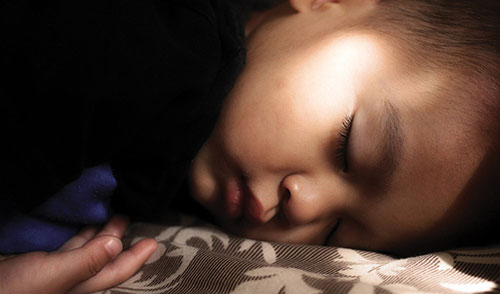Sleep Tips for Children of All Ages
 Sleep is essential to every person's physical, psychological and emotional health, as well as their learning, growth and development.
Sleep is essential to every person's physical, psychological and emotional health, as well as their learning, growth and development.
This is especially true for children, whose ideas about their sleep habits are sometimes very different from those of their parents.
We are not born knowing how to fall asleep; we must learn. Parents need to teach their children how to fall asleep when they're tired. Here are a few tips and recommendations for children across all ages. (By the way, the current recommendation for adults is nine hours of sleep per night!)
Infants and Toddlers
- Infants up to 6 months of age are asleep more than they're awake. Think in terms of 90 minutes; infants are ready to sleep again after being awake for 90 minutes, regardless of how long they've slept. As they get older, they increase their awake time in 90-minute increments (i.e., they gradually move from being awake 90 minutes to being awake 180 minutes between naps).
- Infants typically wake for and need nighttime feedings until they are 6 months old.
- By the time they are 1, most infants take two naps – one in the morning and one in the afternoon. By age 2, children typically take one nap in the early afternoon. Naps are important until children reach age 4, when they start to give them up.
Recommended Total Hours of Sleep for Infants and Toddlers (by age) - 1 week: 16 hours
- 1 month: 14 hours
- 6 months: 12.5 hours
- 12 months: 11.75 hours
- 2 years: 11.5 hours
Preschoolers and School-Aged Children
If you have kids between the ages of 3 and 10, you're probably used to some sort of bedtime avoidance. “I need a glass of water!" is a common one. Or maybe it's the child who sneaks under the covers in Mom's and Dad's bed for a late-night snuggle.
For all sorts of reasons, kids in this age range often don't like the idea of going to sleep. This is understandable; after all, in a child's mind, sleep means “the fun of the day is over." So it's no wonder that many young kids hold out as long as they can before finally drifting off to sleep.
- We learn how to fall asleep, so if your child is awake in the night, something is probably different in his or her sleep routine. Maybe your child fell asleep next to Dad or a sibling, and now that person is not there. Transition objects like a stuffed animal or blanket can help if they are part of the bedtime routine.
- “White noise," such as a fan, can help a child fall asleep or fall back to sleep.
- If your child has nightmares, stay calm and reassure your child he or she is safe.
- Nightlights in your child's room are okay, but are not necessary.
- Create a bedtime routine and set a regular bedtime that allows your child to get enough sleep.
Recommended Total Hours of Sleep for Preschoolers and School-Aged Children (by age)
- 4 years: 11 hours
- 5 years: 10.75 hours
- 6 years: 10.5 hours
- 8 years: 10.25 hours
- 10 years: 10 hours
Tweens and Teens
Many changes in sleep habits occur just before and during the teenage years. Many, if not most, teenagers would prefer to stay up late and sleep late. Here are a few tips for helping your teen sleep better at night and get up when he or she is supposed to:
- Practice healthy sleep hygiene habits: nothing but sleep happens in bed; the bedroom should be quiet and dark for sleep; your child gets ready for bed just before bedtime.
- Work with your teen to set a bedtime and stick to it. (Teenagers are very good at finding all kinds of excuses for not going to bed on time and reasons for staying up later.) Make sure the lights are out by the designated time.
- Your teenager should finish all homework before 10 p.m. Unfinished homework is a common excuse for why teens can't get to sleep, and it's often difficult for parents to send their teens to bed knowing they haven't completed their homework.
- Remove or turn off ALL electronics at bedtime. If necessary, have your teenager turn them over to you at night.
- Your teen should avoid drinking caffeine after 7 p.m. Too many teenagers drink highly caffeinated products at night to help them focus on their homework. This makes it very difficult to fall asleep.
Do not allow your teenager to sleep well into the afternoon on the weekends. He or she can stay up later on weekend nights, but only until a reasonable time. Getting away from a sleep routine over the weekends can disrupt your teen's sleep schedule during the school week.
Recommended Total Hours of Sleep for Tweens and Teens (by age) - 12 years: 9.75 hours
- 13 years: 9.5 hours
- 15 years: 9.25 hours
- 17 & older: 9 hours
Additional Resources
-
Good Night, Sweet Dreams, I Love You: Now Get Into Bed and Go to Sleep! by Patrick C. Friman
-
Solve Your Child's Sleep Problems by Richard Ferber
-
The Bedtime Pass by Connie J. Schnoes, Ph.D.
Download Printable Version
Kid Tips;Sleep Tips;Sleep Issues
